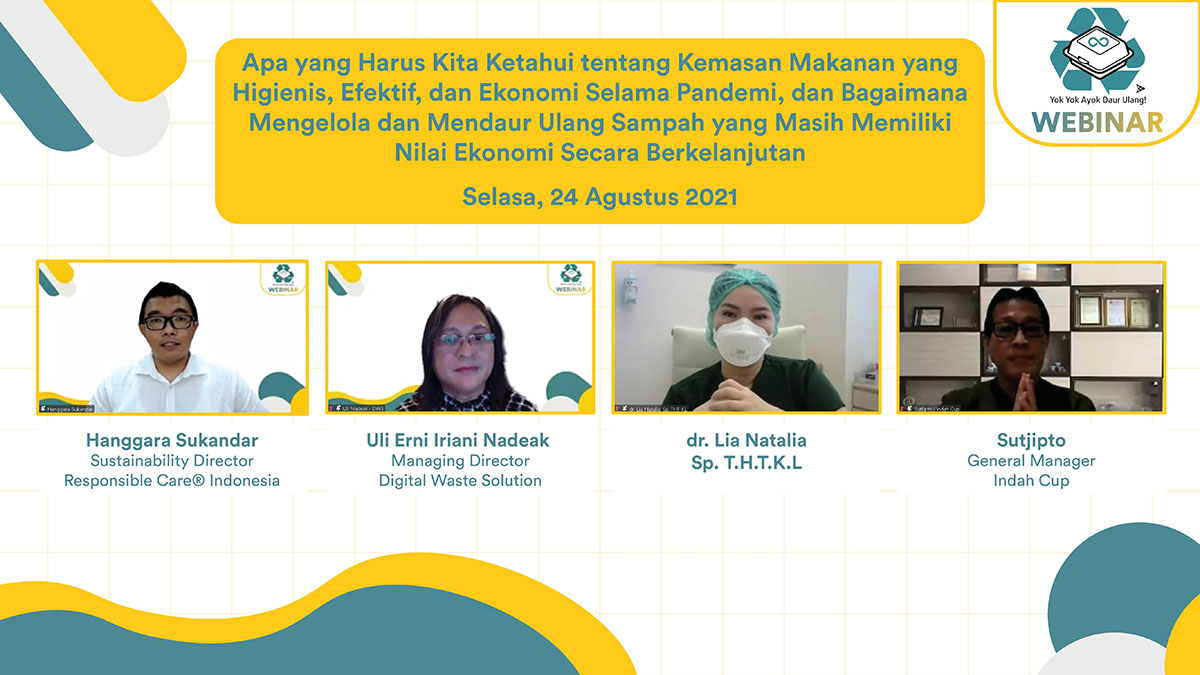
Jakarta, August 24 2021 -- After one year since the first webinar, a sustainable waste management and recycling program conducted by PT Trinseo Materials Indonesia which is also supported by the Kemasan Group, Yok Yok Ayok Daur Ulang! (YYADU!) was again carried out with the aim to remind the public about the importance of managing household waste, especially with the imposition of restrictions on activities outside the home and the increase in online food orders.
The restrictions on activities outside the home and a prohibition on eating in restaurants have led to an increase in online food delivery. This increase causes an increase in demand for food packaging. Public awareness of cleanliness and hygiene is getting higher, especially during the Covid-19 pandemic which is still continuing today. Presenting safe, hygienic, and economical food packaging is something that needs to be considered considering the trend of online food delivery which is expected to continue post-pandemic.
The talk show session of the webinar hosted by Hanggara Sukandar, Sustainability Director of Responsible Care® Indonesia opened with an explanation from Sutjipto, General Manager of Indah Cup, in which several things were delivered, one of which was regarding the increasing demand for food packaging made from PS which is quite varied due to restrictions on activities outside the home.
“Restrictions on activities outside the home have changed people's habits from those who are used to dine-in in restaurants, to takeaway or delivery orders. This has caused the demand for food packaging, especially PS, to increase quite well," Sutjipto explained.
Throughout the Implementation of Community Activity Restrictions (PPKM), there was an increase in the demand for packaging, both primary and secondary packaging, which was estimated at 3-5% compared to the previous PPKM. PS food packaging is considered efficient and economical in meeting the increasing demand which is quite high because of its affordable price and safety in maintaining food when it is delivered from the restaurant to the customer.
Besides being efficient and economical, PS food packaging is considered effective in protecting the food that is being delivered against contamination. This is seen as important because public awareness of the cleanliness and hygiene of items used daily is getting higher, starting from the use of masks to cutlery and food packaging. This was conveyed by dr. Lia Natalia Sp. THT-KL who was also present as one of the speakers at the webinar.
“Many people are becoming more careful in choosing the type of food packaging. The things that people consider in choosing food packaging include; hygienic packaging, reusable packaging, and recyclable packaging,” explained dr. Lia Natalia.
On this occasion, dr. Lia Natalia Sp. ENT-KL also conveys how disposable food packaging is very effective in preventing cross contamination, a process of accidentally transferring viruses from one object or person to another.
“Plastic food packaging is being recommended, especially at this time and situation. In addition to its ability to protect food against contamination and preserve food longer to minimize the use of preservatives, plastic food packaging is a recyclable material," she added.
It did not stop there, the talk show session was continued by Uli Erni Iriani Nadeak as Managing Director of Digital Waste Solution (DWS), who had the opportunity to explain about sustainable waste management. DWS itself is an integrated, sustainable, and digital 4.0-based waste management system which refers to Presidential Decree 97 of 2017.
“The DWS application system was created to carry out the commitment of Extended Product Responsibility as a guide for producers to work together to reduce packaging waste to create a circular economy and actively support major initiatives of the Indonesian government," explained Uli introducing DWS.
According to Uli, waste management and recycling activities in Indonesia still have a lot of room for improvement. This of course can be started from public awareness about the importance of managing and recycling waste itself, so that waste, especially plastic waste, will not be scattered in the environment. The current condition of waste management is still facing obstacles, including waste that is still disposed inappropriately, the waste that is disposed is not properly sorted, causing it to be often not transported.
“With what has been conveyed by Pak Sutjipto and doctor Lia, it can be seen that we cannot be separated from plastic. Therefore, what must be understood now is how we manage the waste so that it does not end up polluting the environment. One of the ways is to manage and sort waste properly and then recycle it,” explained Uli.